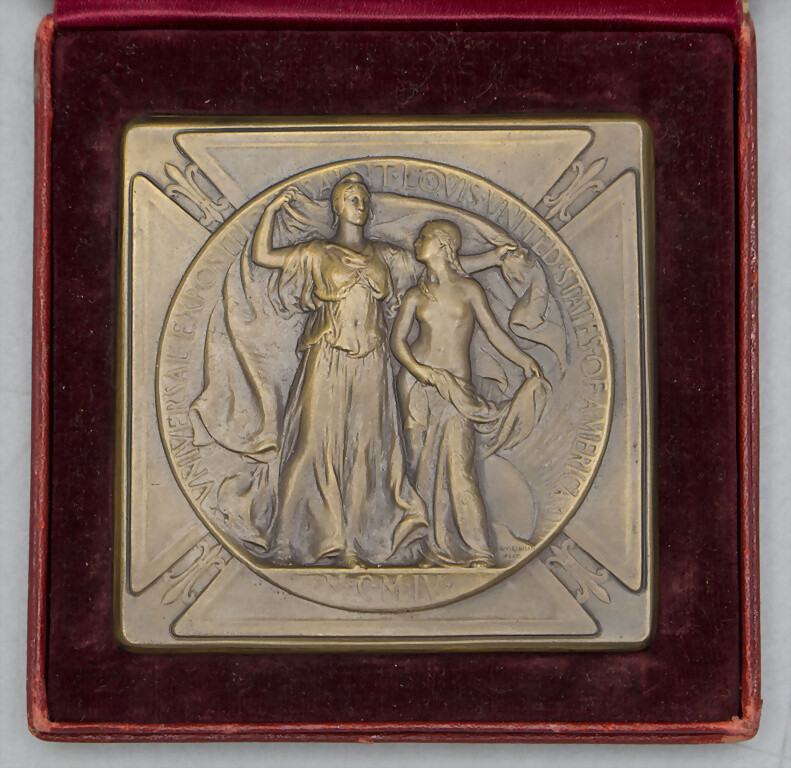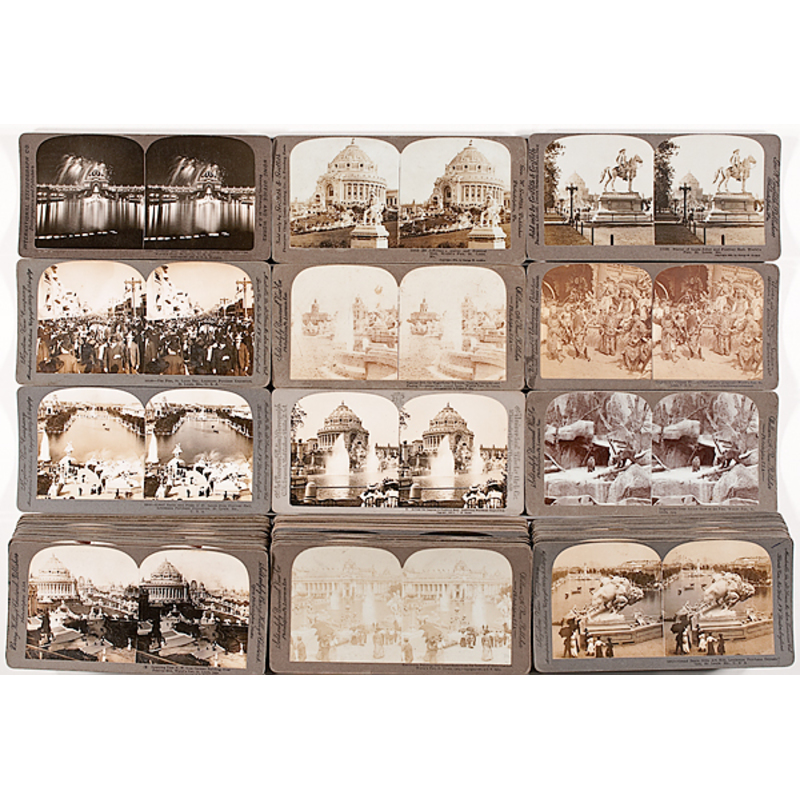Lot of approximately 3,000 pieces, mostly letters. Ca 1898-1926 (bulk of materials 1902-1903). By the fall of 1902 Thomas W. Cridler, Commissioner to Europe for the Louisiana Purchase Exposition, had already been in Europe for months painstakingly pursuing the participation of European nations in the much-heralded Saint Louis World’s Fair of 1904. In a letter to a fellow diplomat at the US Consul in Turkey, Cridler wrote, I want to make a success of my mission, and shall omit no opportunity to do so. I want to show my friends that although I spent so many years, and the best years of my life, in the Department of State, I can apply my knowledge to good account in another sphere. It is due them, but infinitely more due to myself and my family…. But, mark my word, I shall go back to the Department after a while, if I live, in a better position. I have some scores to payoff, and I have an excellent memory. In this extensive manuscript collection of approximately 3,000 pieces, Thomas W. Cridler provides a unique look into not just the challenges he faced securing the participation of European nations at the Fair, but also into the difficulty, diplomacy, and at times the intrigue associated with life as a diplomat. With letters representing 28 foreign countries, and hundreds of ancillary items including photographs, a stamp collection, business cards, telegrams, receipts, handwritten notes, legal documents, postcards, newspaper clippings, speeches, shipping invoices, and a multitude of official World’s Fair publications, this archive is a treasure trove of information relating to the St. Louis World’s Fair and the lives of the American diplomatic corps at the turn of the century. Thomas Wilbur Cridler (b. 1850 - d. 1914) was born in Harper’s Ferry, West Virginia. He studied law and on October 1, 1875, was appointed as a clerk at the Department of State. This commenced what would be a lengthy career as a diplomat, rising from clerk to Chief of the Diplomatic Bureau, and ultimately to appointment as Third Assistant Secretary of State on April 8, 1897. While serving as Third Assistant Secretary, Cridler was present for the signing of the Treaty of Paris in 1898 and was appointed by President McKinley to be Special Commissioner to the 1900 Paris Exhibition. On November 15, 1901, Cridler resigned his post at the Department of State. Little was written in the prominent papers about the reason for this resignation; however, the archive offers two possible explanations. In July 1901 Cridler removed to Seabright, New Jersey, to recover from what he described in a 1902 letter as a severe attack of typhoid fever. Cridler’s letters make multiple mentions of this illness, which by his own account, left him quite ill and caused a significant weight loss. Another possible explanation for his resignation is found in a clipping in the manuscript collection from a Copenhagen newspaper dated January 7, 1903. The accompanying translation of the article states that Jules Blom, former Vice Consul for the US in Copenhagen, resigned after being assaulted in January 1900 by a drunken Consul Ingersoll, and later succeeded in getting Ingersoll removed from Copenhagen and in having his friend Mr. Cridler, Chief for Consular Affairs in the Department of State in Washington, discharged. Regardless of the reason, Cridler did resign as Third Assistant Secretary, and soon was appointed European Commissioner for the Louisiana Purchase Exposition, otherwise known as the St. Louis World’s Fair. The St. Louis World’s Fair was intended to celebrate and commemorate the centennial of the 1803 Louisiana Purchase. Like the American expositions that had preceded it - Philadelphia in 1876, Chicago in 1893, and Buffalo in 1901 - the St. Louis World’s Fair demonstrated to a worldwide audience America’s transformation into an industrial powerhouse and expressed America’s pride in her accomplishments. The St. Louis World’s Fair, however, was the grandest of them all, with a size
Lot of approximately 3,000 pieces, mostly letters. Ca 1898-1926 (bulk of materials 1902-1903). By the fall of 1902 Thomas W. Cridler, Commissioner to Europe for the Louisiana Purchase Exposition, had already been in Europe for months painstakingly pursuing the participation of European nations in the much-heralded Saint Louis World’s Fair of 1904. In a letter to a fellow diplomat at the US Consul in Turkey, Cridler wrote, I want to make a success of my mission, and shall omit no opportunity to do so. I want to show my friends that although I spent so many years, and the best years of my life, in the Department of State, I can apply my knowledge to good account in another sphere. It is due them, but infinitely more due to myself and my family…. But, mark my word, I shall go back to the Department after a while, if I live, in a better position. I have some scores to payoff, and I have an excellent memory. In this extensive manuscript collection of approximately 3,000 pieces, Thomas W. Cridler provides a unique look into not just the challenges he faced securing the participation of European nations at the Fair, but also into the difficulty, diplomacy, and at times the intrigue associated with life as a diplomat. With letters representing 28 foreign countries, and hundreds of ancillary items including photographs, a stamp collection, business cards, telegrams, receipts, handwritten notes, legal documents, postcards, newspaper clippings, speeches, shipping invoices, and a multitude of official World’s Fair publications, this archive is a treasure trove of information relating to the St. Louis World’s Fair and the lives of the American diplomatic corps at the turn of the century. Thomas Wilbur Cridler (b. 1850 - d. 1914) was born in Harper’s Ferry, West Virginia. He studied law and on October 1, 1875, was appointed as a clerk at the Department of State. This commenced what would be a lengthy career as a diplomat, rising from clerk to Chief of the Diplomatic Bureau, and ultimately to appointment as Third Assistant Secretary of State on April 8, 1897. While serving as Third Assistant Secretary, Cridler was present for the signing of the Treaty of Paris in 1898 and was appointed by President McKinley to be Special Commissioner to the 1900 Paris Exhibition. On November 15, 1901, Cridler resigned his post at the Department of State. Little was written in the prominent papers about the reason for this resignation; however, the archive offers two possible explanations. In July 1901 Cridler removed to Seabright, New Jersey, to recover from what he described in a 1902 letter as a severe attack of typhoid fever. Cridler’s letters make multiple mentions of this illness, which by his own account, left him quite ill and caused a significant weight loss. Another possible explanation for his resignation is found in a clipping in the manuscript collection from a Copenhagen newspaper dated January 7, 1903. The accompanying translation of the article states that Jules Blom, former Vice Consul for the US in Copenhagen, resigned after being assaulted in January 1900 by a drunken Consul Ingersoll, and later succeeded in getting Ingersoll removed from Copenhagen and in having his friend Mr. Cridler, Chief for Consular Affairs in the Department of State in Washington, discharged. Regardless of the reason, Cridler did resign as Third Assistant Secretary, and soon was appointed European Commissioner for the Louisiana Purchase Exposition, otherwise known as the St. Louis World’s Fair. The St. Louis World’s Fair was intended to celebrate and commemorate the centennial of the 1803 Louisiana Purchase. Like the American expositions that had preceded it - Philadelphia in 1876, Chicago in 1893, and Buffalo in 1901 - the St. Louis World’s Fair demonstrated to a worldwide audience America’s transformation into an industrial powerhouse and expressed America’s pride in her accomplishments. The St. Louis World’s Fair, however, was the grandest of them all, with a size















Testen Sie LotSearch und seine Premium-Features 7 Tage - ohne Kosten!
Lassen Sie sich automatisch über neue Objekte in kommenden Auktionen benachrichtigen.
Suchauftrag anlegen